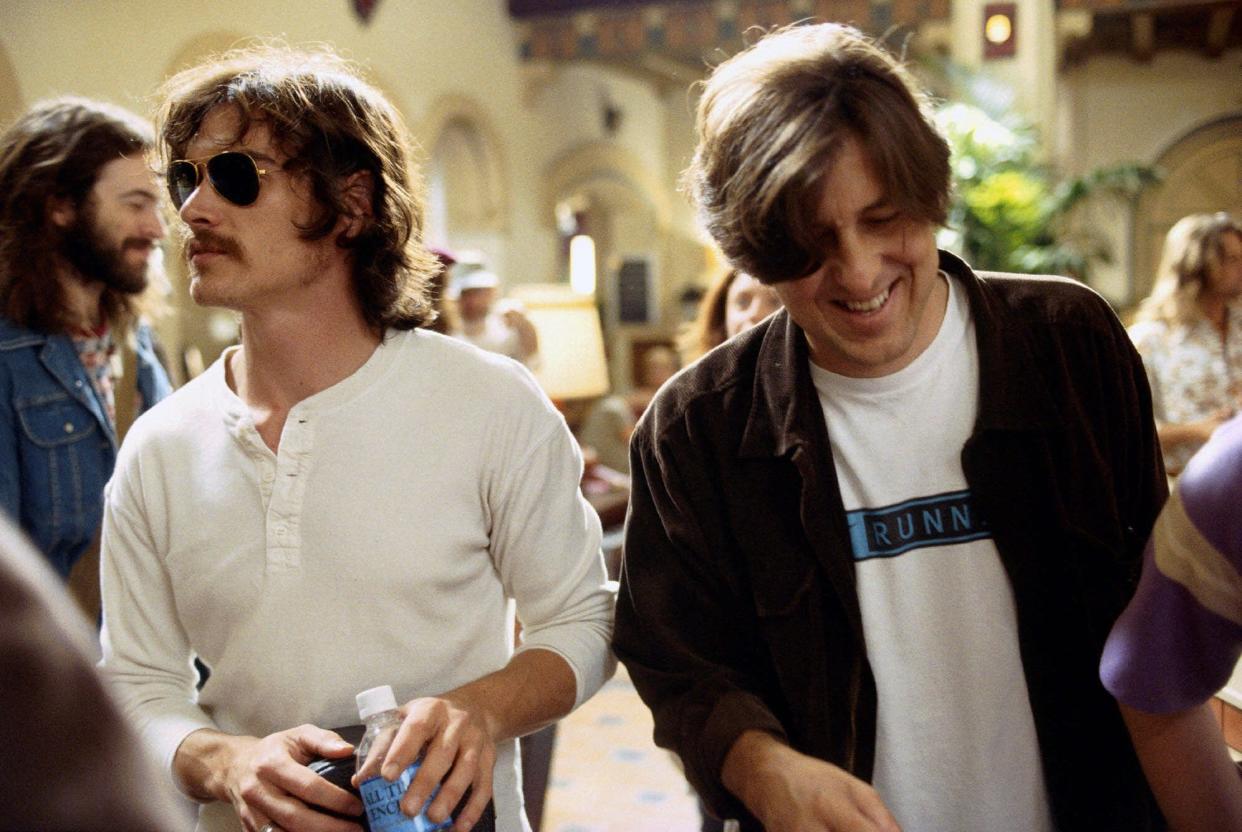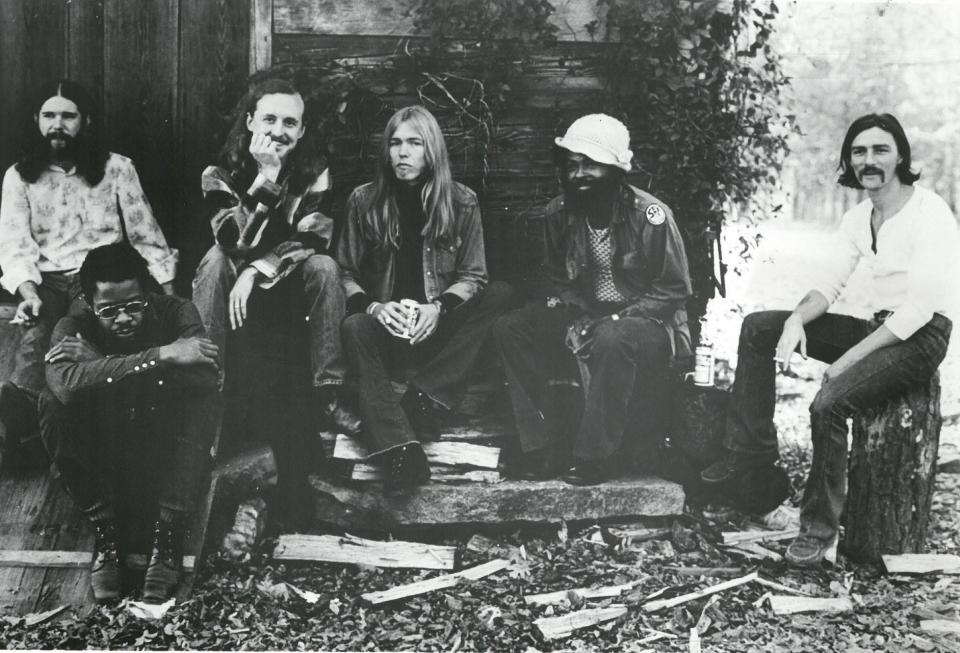'Almost Famous' turns 20: Dickey Betts reveals the true Allman Brothers stories behind the cult classic

Relaxing at home on Little Sarasota Bay, Florida, Dickey Betts laughs when asked what it was like to be a rock star in 1973.
“Well, I don’t know,” he says. “It kind of came on so gradually I didn’t notice it. I’d been working for years before that, you know? It was nice having big crowds and all.” Betts pauses for a moment, then adds, “It sure was a lot of fun.”
The Allman Brothers were one of the biggest, best and hardest partying bands in America in 1973 when a 16-year-old Cameron Crowe joined them on tour that summer to write a Rolling Stone cover story. Crowe would later emerge as a top Hollywood filmmaker and following his blockbuster “Jerry Maguire” made the semi-autobiographical “Almost Famous,” which celebrates its 20th anniversary on Sept. 22. Largely based on Crowe’s experiences on the road with the Allman Brothers – as well as other bands he interviewed on tour during that period, including Led Zeppelin and The Eagles – the film tells the fun, often poignant tale of a young journalist trying to complete a profile of the fictitious rock band Stillwater for Rolling Stone.
“Almost Famous” earned Crowe an Academy Award for his original screenplay and remains a beloved cult classic. While Kate Hudson and Frances McDormand each earned Oscar nominations for best supporting actress, the film’s top-billed star is Billy Crudup, who plays Russell Hammond, the long-haired, mustachioed guitarist for Stillwater. Crudup’s resemblance to Betts is unmistakable. “Crudup’s look, and much more, is a tribute to Dickey,” Crowe told Rolling Stone in 2017. “Dickey seemed like a quiet guy with a huge amount of soul, possible danger and playful recklessness behind his eyes. He was a huge presence.”

That time Cameron Crowe went on the road with the Allman Brothers
By late 1972, Betts had emerged as the Allman Brothers’ leader following the premature deaths of Gregg Allman’s older sibling Duane Allman and Berry Oakley, both killed in eerily similar motorcycle accidents about a year apart. After having largely completed their new album “Brothers and Sisters,” the Allman Brothers returned to the road in early ’73 with a new lineup and new fans, having graduated from playing clubs and theaters to sports arenas and stadiums.
The album spent five weeks at No. 1 and produced the chart-topping single “Ramblin’ Man,” written and sung by Betts.
At the height of their popularity, the Allman Brothers Band was approached about having Crowe join them on the road to write a profile. Problem was, the Allman Brothers weren’t on speaking terms with Rolling Stone after disagreements over a piece published a few weeks after Duane Allman’s death in ’71.
“We had some bad experiences with Rolling Stone,” Betts, 76, says. “So the band was really gun shy about having anyone come on the road with us.
Betts, who had been interviewed by Crowe previously, vouched for him. “And it turned out, he did a good article on us.”
Gregg Allman's best quotes: On fame, addiction and living a colorful life
Almost real? 'Almost Famous' hits theaters
Flash forward to 2000, after Betts' bitter, highly publicized split with the Allman Brothers Band. He rarely goes to movies, but his wife Donna reads about one she thinks they might enjoy, and so they go and see “Almost Famous.” During the opening credits, the camera offers a glimpse of an Allman Brothers Band ticket stub from a show held in Crowe’s hometown of San Diego at the Sports Arena on Aug. 5, 1972. But, it’s not until 20 minutes later that Betts really takes notice: When Billy Crudup walks onscreen as Russell Hammond, the lead guitarist of the band Stillwater and the rock star who becomes closest with William Miller (played by Patrick Fugit), the rock writer based on a teenage Crowe.
“I was pretty shocked, really, it was like watching myself,” Betts says. “It was pretty cool. Billy told me he based the character on me. ... I was pretty flattered.”
The Allman Brothers’ connections to Stillwater continue throughout the film. Red Dog (Zack Ward), a roadie with long red hair and matching beard, is clearly based on original Allman Brothers Band roadie Joseph “The Legendary Red Dog” Campbell, who died in 2011.
There’s a poster of Stillwater on William’s wall seemingly modeled on the “At Fillmore East” album cover and later we hear the Allman Brothers’ explosive live version of “One Way Out” followed by a bus scene with Russell playing slide guitar, something Betts recalls doing on the ’73 tour after taking over lead and slide guitar duties following Duane's death.
'Say Anything' sequel? Director Cameron Crowe wishes he made 'two or three more movies'
When Crowe’s character William attempts to interview Russell at the various hotels, he keeps getting met by “Do Not Disturb” signs on the door. “ ‘Do not disturb. Don’t ring the phone. Don’t knock on the door.’ I had about seven or eight signs on there," Betts remembers. "Because I was sick of being up all night and by the time I got to sleep, the damn maid would be banging on the door. So I put those signs up. That was funny.”
Not everything about “Almost Famous” rings true for Betts, though. For instance, Kate Hudson plays groupie Penny Lane, who has a relationship with Russell before he trades her to the band Humble Pie for $50 and a case of beer during a game of poker. “Yeah, they kind of overdid the groupies. We never experienced anything like (the beer trade)," he says, but the relationships were true to life. "You’d have a relationship and even though it didn’t last very long – there were girls who were a lot of fun, of course – it would keep you going.”
One of the most memorable scenes in “Almost Famous” takes place at a house party thrown by teenagers in Topeka, Kansas. Russell attends with just William and has a great time with his fans, who give him acid. Russell then climbs to the roof of the house and screams “I’m a golden god,” before jumping into the pool below. “That might have been somebody else, one of the other bands, the Eagles or Led Zeppelin,” Betts says. “I never did anything like that.
"I was bad about going home with people, though. And the road manager would be more worried about that. But I’d always be there for the bus the next morning or the next day.”
In the movie, Rolling Stone’s editors are thrilled with William’s profile of Stillwater but when the magazine’s fact checker calls the band, Russell tells her 90% of it has been fabricated and the magazine refuses to run the piece. (Later, Russell verifies the facts and they run it as a cover story.) What actually occurred with the Allman Brothers cover story, though, is that Crowe nearly had his assignment ruined after Gregg Allman confiscated his interview tapes upon fearing he had revealed too much, or perhaps being worried that Crowe was an undercover cop.
“I said, ‘Well, I’ll get ’em for you.’ And I went down and talked Gregg out of them and got his tapes back for him. I took to Cameron Crowe, I liked him. He was a young kid, you know, trying to make a big break for himself.”
What Dickey Betts loves most about music
One of the most touching scenes in “Almost Famous” occurs at the end, when Russell is in William’s bedroom and the young journalist gets out his tape recorder and asks Russell, “What do you love about music?” Betts, who retired a couple of years ago following a mild stroke that affected his right hand, is asked the same question.
“I like the crowds mainly, and what the music did for them,” he says. “They got more out of the music than I did. ... I just really get a kick out of the audience and how they could just kind of drift away to another world in a concert.”
New in streaming: This essential CREEM documentary gets to the rock magazine's irreverent, outrageous heart

Dickey Betts and Gregg Allman were inducted into the Rock and Roll Hall of Fame together along with the rest of the surviving Allman Brothers Band members in 1995 before going their separate ways in 2000. Today, of the founding six-man Allman Brothers Band lineup, only Betts and drummer Jaimoe are still alive.
Of course, Allman Brothers fans have all the albums to return to, but it’s also nice to know the band’s spirit lives on in Crowe’s smart, heartwarming film.
“It was a pretty accurate movie,” Betts says. “It was entertaining, too. It was just well done all the way around. And it was probably the closest to what the road is like more than any rock movie that I have seen. It was really close.”
Wade Tatangelo wrote the liner notes for the Dickey Betts Band’s 2019 CD/DVD “Ramblin’ Man Live at the St. George Theatre.”
10 albums you need to hear this month: Katy Perry, Deep Purple and Glass Animals
This article originally appeared on Sarasota Herald-Tribune: 'Almost Famous' at 20: Dickey Betts fact checks what's real/what isn't

